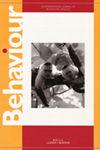野生平原斑马(Equus quagga)杀婴未遂和雌-雌合作的观察
IF 1
4区 生物学
Q4 BEHAVIORAL SCIENCES
引用次数: 1
摘要
据报道,在广泛的分类群中,雄性杀婴行为是一种改变母体投资方向和增加雄性繁殖后代机会的策略。平原斑马(Equus quagga)具有许多有利于杀婴的社会组织和生活史特征。然而,大多数记录在案的病例来自圈养动物,而在对自由放养种群的研究中尚未发现。在这里,我们报告了一个明显的杀婴企图,其中所有参与者的历史关联是已知的。此外,我们还报道了该物种中第一例非亲缘雌性-雌性合作防御雄性攻击的实例。我们讨论了为什么这种行为可能没有被其他纵向研究观察到。然后,我们探讨了种内和个体间的变异如何影响其相对稀有性,平原斑马的生殖生物学如何与这种行为相关,以及非亲属之间的雌性-雌性合作如何作为一种有效的对抗策略。本文章由计算机程序翻译,如有差异,请以英文原文为准。
An observation of attempted infanticide and female–female cooperation in wild plains zebras (Equus quagga)
Male infanticide has been reported in a wide range of taxa as a strategy for redirecting maternal investment and increasing a male’s chance of siring future offspring. Plains zebras (Equus quagga) possess many of the social organization and life history traits found to favour infanticide. However, most documented cases are from captive animals, while it has not been detected in studies of free-ranging populations. Here, we report an apparent infanticide attempt in which the historical associations of all participants were known. In addition, we report the first instance of non-kin female–female cooperative defence against male aggression in this species. We discuss why this behaviour may not have been observed by other longitudinal studies. We then explore how intraspecific and inter-individual variation may factor into its relative rarity, how the reproductive biology of plains zebras relates to this behaviour, and how female–female cooperation between non-kin can operate as an effective counterstrategy.
求助全文
通过发布文献求助,成功后即可免费获取论文全文。
去求助
来源期刊

Behaviour
生物-动物学
CiteScore
1.80
自引率
7.70%
发文量
44
审稿时长
3 months
期刊介绍:
Behaviour is interested in all aspects of animal (including human) behaviour, from ecology and physiology to learning, cognition, and neuroscience. Evolutionary approaches, which concern themselves with the advantages of behaviour or capacities for the organism and its reproduction, receive much attention both at a theoretical level and as it relates to specific behavior.
 求助内容:
求助内容: 应助结果提醒方式:
应助结果提醒方式:


